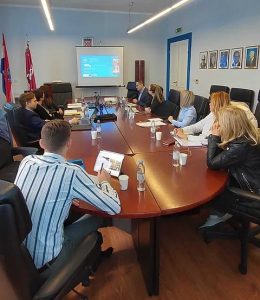25 Oct 2nd VIBES transnational meeting – IO1 and IO2 results presented, IO3 officially launched
On 14-15 October 2021, the VIBES consortium held its 2nd transnational project meeting. The meeting took place at the University of Dubrovnik, Croatia, but due to Covid restrictions some partners also participated online.
In the past months, the VIBES team has been working hard on the tasks of IO1 and IO2 and the results of these efforts were presented and discussed during the project meeting. As part of IO1, and led by IHF, one of project partners, the team prepared a report on European best practices for developing virtual teamwork skills. The report, presented during project meeting, revealed that universities and schools are still looking for ways to adequately integrate training and learning in virtual teamworking skills development into their educational activities.

The consortium also discussed the results of a cross-national survey of the business sector undertaken within IO2 under guidance of Estonian partners EBS and Smartworks. This survey interviewed representatives of the business sector to identify the most important competences for virtual intercultural teamwork. Based on the responses collected, the VIBES team identified a range of competences that businesses consider relevant.These results will be used as input in the development of project training in IO3. The report with the results of the survey is in preparation and will be publicly available soon.
 The final task of the meeting was the official launch of the IO3 training development activities. Led by LAB, the partner responsible for coordinating IO3 activities, the IO3 methodology was presented and adopted. In the coming months, the VIBES teams will work on providing training targeted at the competences for virtual teamwork identified as most important by the business sector representatives in the VIBES survey.
The final task of the meeting was the official launch of the IO3 training development activities. Led by LAB, the partner responsible for coordinating IO3 activities, the IO3 methodology was presented and adopted. In the coming months, the VIBES teams will work on providing training targeted at the competences for virtual teamwork identified as most important by the business sector representatives in the VIBES survey.
VIBES is an international project funded by the Erasmus+ KA226 programme and aims to strengthen the virtual intercultural teamwork competences of pupils, students and master students. It is coordinated by the Centre for Research of Digital Transformation CREDO at the University of Dubrovnik and includes partners from Croatia, Finland, Estonia, Belgium and Switzerland.



